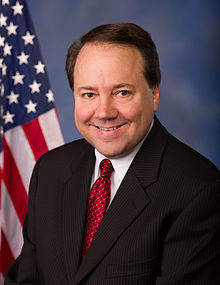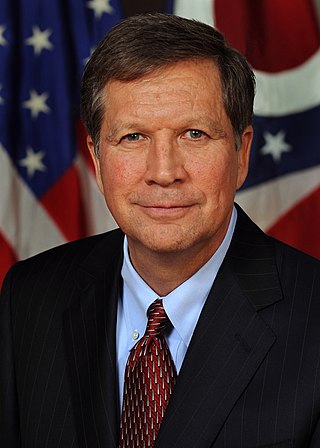
John Richard Kasich Jr. is an American politician and author who was the 69th governor of Ohio from 2011 to 2019, a member of the U.S. House of Representatives from 1983 to 2001, and a Republican candidate for the presidential nomination in 2000 and 2016.
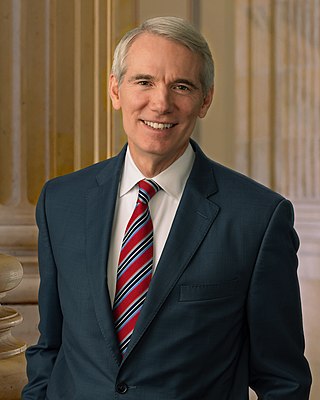
Robert Jones Portman is an American attorney and politician who served as a United States senator from Ohio from 2011 to 2023. A member of the Republican Party, Portman was the 35th director of the Office of Management and Budget (OMB) from 2006 to 2007, the 14th United States trade representative from 2005 to 2006, and a U.S. representative from 1993 to 2005, representing Ohio's 2nd district.

John Abney Culberson is an American attorney and politician who served in the United States House of Representatives from 2001 to 2019. A Republican, he served in Texas's 7th congressional district in large portions of western Houston and surrounding Harris County. In his 2018 re-election campaign, he was defeated by Democrat Lizzie Fletcher. He subsequently began work as a lobbyist.

Michael Clifton Burgess is an American physician and politician representing Texas's 26th congressional district in the United States House of Representatives. The district is anchored in Denton County, a suburban county north of Dallas and Fort Worth. He has held the position since 2003 and is a member of the Republican Party.

Marian Elaine "Mimi" Walters is an American businesswoman and politician. A member of the Republican Party, she served from 2015 to 2019 as the U.S. representative for California's 45th congressional district.

Steven Ernst Stivers is an American businessman and politician who was the U.S. representative for Ohio's 15th congressional district from 2011 until 2021. He is a member of the Republican Party, and became chair of the National Republican Congressional Committee in 2017. Stivers previously served in the Ohio Senate, representing the 15th district. He is a major general in the Ohio Army National Guard, serving as the Assistant Adjutant General, and served active duty in Iraq as a battalion commander until December 2005. On May 16, 2021, he resigned his seat to become the president and CEO of the Ohio Chamber of Commerce.

Erik Philip Paulsen is an American businessman and politician who represented Minnesota's 3rd congressional district in the United States House of Representatives from 2009 to 2019. A member of the Republican Party, he served in the Minnesota House of Representatives from 1995 to 2009 and as majority leader from 2003 to 2007.
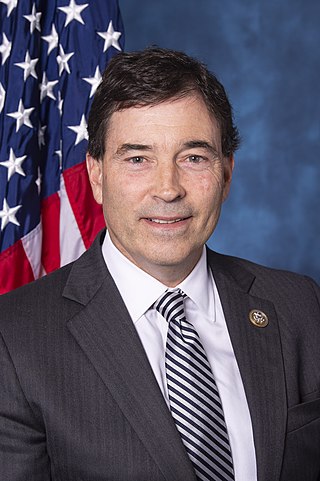
William Troy Balderson is an American politician and businessman serving as the U.S. representative from Ohio's 12th congressional district since 2018. He served as an Ohio state senator representing the 20th district from 2011 until his election to Congress. A member of the Republican Party, he was a member of the Ohio House of Representatives from 2009 to 2011.

Daniel Michael Donovan Jr. is an American attorney, former prosecutor and politician. A member of the Republican Party, he served as the U.S. representative for New York's 11th congressional district from 2015 to 2019. Donovan served as District Attorney of Richmond County from 2004 to 2015. He was first elected to Congress in a special election following the resignation of Michael Grimm. The district includes all of Staten Island, as well as portions of southwest Brooklyn. Donovan was defeated for reelection in 2018 by Democrat Max Rose.

Bruce Lee Poliquin is an American businessman and politician. A member of the Republican Party, he represented Maine's 2nd congressional district in the United States House of Representatives from 2015 to 2019. Poliquin was first elected to Congress in the 2014 general election. From 2010 to 2012, he was the 49th Maine State Treasurer. He was a candidate for the Republican nomination for the U.S. Senate in 2012, finishing second in the primary election. In January 2017, at the start of the 115th Congress, Poliquin was the sole Republican representing a U.S. House district in New England.

Rodney Lee Davis is an American politician and lobbyist who served as the U.S. representative for Illinois's 13th congressional district from 2013 to 2023. Davis's tenure ended when redistricting led to a primary race in the Illinois's 15th against fellow incumbent Mary Miller.
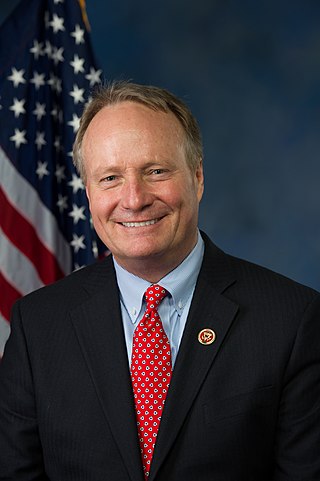
David Patrick Joyce is an American politician and attorney currently serving in the United States House of Representatives for Ohio's 14th congressional district since 2013. A member of the Republican Party, Joyce was previously the prosecutor of Geauga County, Ohio.

Thomas Charles MacArthur is an American former insurance executive and politician. He served as the U.S. representative for New Jersey's 3rd congressional district from 2015 to 2019. A Republican, MacArthur served on the city council of Randolph, New Jersey, from 2011 through 2013, and as its mayor in 2013. He was elected to the U.S. House of Representatives in 2014. After leaving Congress MacArthur returned to private business.

Carlos Luis Curbelo is an American politician who served as the U.S. representative for Florida's 26th congressional district from 2015 to 2019. In 2018, he was narrowly defeated for re-election by Democrat Debbie Mucarsel-Powell. He is a member of the Republican Party. Prior to his election to the U.S. House, he served on the Dade County School Board.

Rodney Leland Blum is an American businessman and politician who served as the U.S. representative for Iowa's 1st congressional district from 2015 to 2019. A member of the Republican Party, he was first elected in 2014 and won a second term in the 2016 elections.
The following is a list of efforts to repeal the Affordable Care Act, which had been enacted by the 111th United States Congress on March 23, 2010.

The following is a list of plans which were considered to replace the Affordable Care Act during the Donald Trump administration. The plans were considered after the Republican Party gained a federal government trifecta in 2016. "Repeal and replace" has been a Republican slogan since March 2010 when the ACA was signed into law and had been adopted by former President Donald Trump.

The American Health Care Act of 2017 was a bill in the 115th United States Congress. The bill, which was passed by the United States House of Representatives but not by the United States Senate, would have partially repealed the Affordable Care Act (ACA).

The Executive Order Promoting Healthcare Choice and Competition, also known as the Trumpcare Executive Order, or Trumpcare, is an Executive Order signed by Donald Trump on October 12, 2017, which directs federal agencies to modify how the Patient Protection and Affordable Care Act of the Obama Administration is implemented. The order included a directive to federal agencies to end rules forbidding employers from using health reimbursement arrangements (HRAs) to pay individual insurance premiums.

A special election for Ohio's 12th congressional district was held August 7, 2018, following the resignation of Republican U.S. Representative Pat Tiberi. The Republican Party nominated State Senator Troy Balderson for the seat while the Democratic Party nominated Franklin County Recorder Danny O'Connor. Balderson led O'Connor in preliminary results; however, the race was not officially called on election night. Counting of outstanding ballots began on August 18 and was completed on August 24. The outstanding ballots did not change the margin enough to trigger an automatic recount, so Balderson was declared the winner on August 24.
